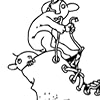To answer questions about
The Trial,
please sign up.
Emma
As Simon said, he actually wrote the last chapter (along with the first chapter) first as to not get too off track from his original idea since when Kafka wrote, he followed whatever ideas came to him in the spontaneity of the moment, rather than any outline. Therefore, it is believed that the last chapter is closely tied to the first, and that it is even an effect of it. The copy that I read (the Mike Mitchell translation) included explanatory notes as well as an introduction that broke down the plot and the devices Kafka used, which was very helpful. I would recommend it (it explains everything a lot better than I can) if you are still interested and looking for an answer.
Thomas Stærmose
Kafka never finished the story. It is pieced together by the finished and the almost finished chapters and published after his death, while other chapters are totally unfinished and only included in some editions.
leonel
This is the actual answer for those clicking after years on this question.
The unfortunates of the most literal answer, rather than death of the author that is articulated by others' perspectives, is that Kafka was not proud of his writing, and thus never finished any of it. The last chapter may have been written in the beginning, but the reason was simply so that it had an ending, since nothing before it did.
The ending does make a lot of sense in that manner, if you think that after the cathedral, 10, 15 [...] chapters happened, and then came the ending. K. did something, or something happened to him, that made him a danger to the courts, thus causing his doom. It was inferred before that the courts function as an organism & ecosystem, not as a unified system under law, so control over his life may have fallen in the hands of a singular person, or 'the ones in charge'.
Consider the ending akin to 1984, where the upper party controls the flow of information, and Kafka for some reason or another, was convicted in a similar manner to Orwell's protagonist, reasonably or not, a danger to the system.
The unfortunates of the most literal answer, rather than death of the author that is articulated by others' perspectives, is that Kafka was not proud of his writing, and thus never finished any of it. The last chapter may have been written in the beginning, but the reason was simply so that it had an ending, since nothing before it did.
The ending does make a lot of sense in that manner, if you think that after the cathedral, 10, 15 [...] chapters happened, and then came the ending. K. did something, or something happened to him, that made him a danger to the courts, thus causing his doom. It was inferred before that the courts function as an organism & ecosystem, not as a unified system under law, so control over his life may have fallen in the hands of a singular person, or 'the ones in charge'.
Consider the ending akin to 1984, where the upper party controls the flow of information, and Kafka for some reason or another, was convicted in a similar manner to Orwell's protagonist, reasonably or not, a danger to the system.
Greg
It was a cockroach in the conservatory with a knife what did in Missy, the maid.
Anmol Mishra
What the story actually is about is better left unfinished, because in this way many personal interpretations can be drawn. Kafka gave a hint in last to last chapter that everyone has a different door to enter the law. Now this 'Law' and 'the Court' of Kafka are certainly not the usual law or the usual court- they are something metaphysical and religious. And thus book must be interpreted uniquely by each man, for which its incompleteness is quite instrumental. I'm not saying that Kafka left it incomplete on purpose, it might have been an accident, but the story is more fulfilling to its purpose this way.
Emilia Sur
Hello!. IN the edition I read, there were afterwords from Max Brod and in one of them he shares a conversation with Franz Kafka. This conversation reveals that Kafka had written the first and the last chapters, so as to have an outline which to fill withe the rest of the story.
While the story unfolded and Josef K. sees his cause relayed to ever further and higher-placed and thus more elusive authorities, Kafka noticed that the story could enter an endless loop, so "cutting" the story short and "pasting" the final chapter on that seemed the solution for this novel. And it is what he chose and what we have.
I hope this helps.
While the story unfolded and Josef K. sees his cause relayed to ever further and higher-placed and thus more elusive authorities, Kafka noticed that the story could enter an endless loop, so "cutting" the story short and "pasting" the final chapter on that seemed the solution for this novel. And it is what he chose and what we have.
I hope this helps.
Jonas Carlsson
To me, the ending was very much about one question - if you know that you're condemned to a certain fate and that there's no wait out, do you then submit totally to that fate or try to resist it as best as you can in your final moments? In the beginning of the final chapter, K. submits to his fate, but then he suddenly gets the urge to rebel somewhat in his final moments. His final words are "like a dog" - I interpreted it as him commenting on what is happening to him right now. He's been pulled through this crazy circus and has now become so disillusioned that people can just put him down as if he were a dog.
About Goodreads Q&A
Ask and answer questions about books!
You can pose questions to the Goodreads community with Reader Q&A, or ask your favorite author a question with Ask the Author.
See Featured Authors Answering Questions
Learn more









